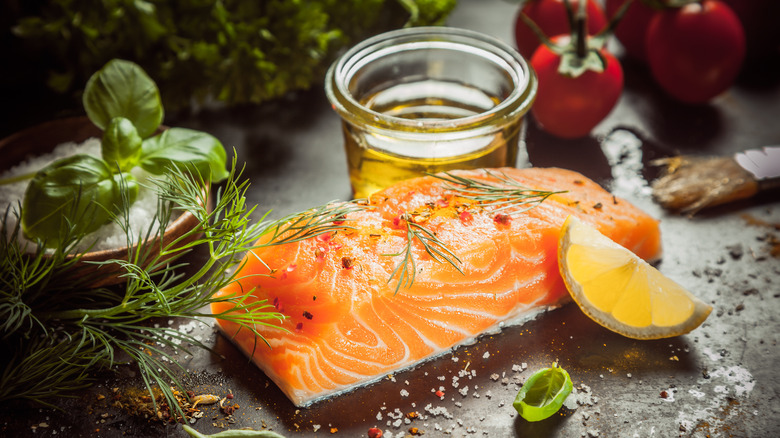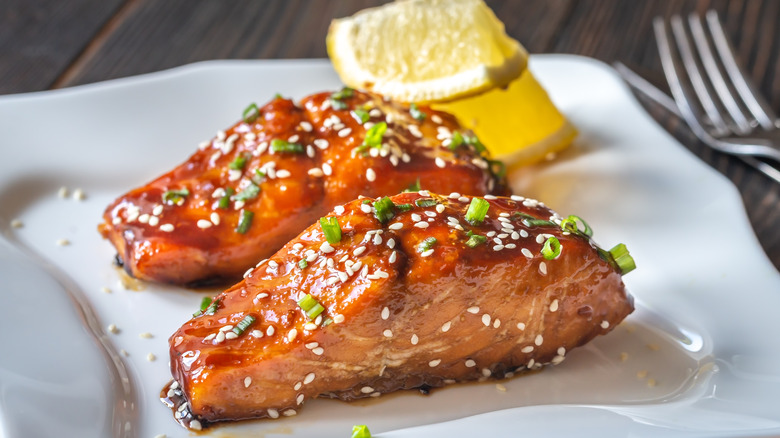The Best (And Worst) Type Of Marinade For Salmon
Salmon is a rare treat in that it is both delicious and good for us: It can help reduce the risk of high blood pressure, arthritis, and perhaps even Alzheimer's disease due to being high in Omega-3 fats; it lowers the risk of heart disease since it is loaded with vitamin B12. It also contains the trace mineral selenium, which protects bones and potentially reduces the risk of certain cancers. Since protein has become the "in-word" today when discussing nutrition, salmon ranks high in this department also. Because protein-rich food like salmon temporarily raises your metabolic rate, eating it regularly can help improve your overall energy levels. And as it is, of course, one of the tastiest fish on the market, it has become a regular in many kitchens and restaurants.
So what's not to love? Because of its popularity, people are always searching for different ways to prepare and flavor salmon. However, getting perfectly crisp skin can sometimes seem tricky. Here's a look at what marinades pair well (or not so well) with this delicious fish.
Oil is a salmon's best friend
Using an oil-based marinade is ideal as it can be difficult to make the salmon skin crispy if it contains too much water. By using an oil-based marinade, the salmon will stay tender on the inside and crispy on the outside. It is important not to marinate too long. Keep it to 30 minutes as any longer will cause the marinade to break down the fish and make it mushy. This is especially true if using acid-based ingredients like citrus juice and vinegar. Be wary of too much water in your marinade, as this may prevent salmon skin from crisping.
Since too much salt can dry out the fish, a good marinade could include sweet ingredients such as brown sugar or maple syrup. Ground spices, as opposed to whole ones, are more effective at penetrating the fish. However, fresh garlic — rather than powdered — has a more robust flavor, adding more depth to a dish. Using olive oil, along with dijon mustard, red wine vinegar, and Italian herbs in your marinade will give it a savory flair. Likewise, in order to get that sweet and umami taste, marinade with soy sauce, brown sugar, and vegetable oil.
Less is more
While a sweet oil-based glaze (like bourbon-glazed salmon) is ideal, the main thing that doesn't fare well is to over-marinate the fish, which can cause it to be soggy. Also, if the marinade contains too much water, it will stop the salmon from getting crispy on the outside, thus ruining the consistency as well as the taste. With that in mind, go with a marinade that isn't too salty or watery, and pick one that uses an oil that will complement the fish — olive oil is a good bet, but so is something neutral.
Keep in mind that while it can be fun to experiment and come up with your own unique marinade, rather than throwing in everything but the kitchen sink (including lots of liquid), you should match flavor profiles. For example, if you're going with a soy-forward glaze, this isn't the time to add multiple kinds of vinegar, the dregs of your favorite whiskey barbecue sauce, and every seasoning in the pantry. Less truly can be more!
But what's the real takeaway here? Salmon needs oil-based marinades and glazes, no matter what else you decide to add to your fish.


